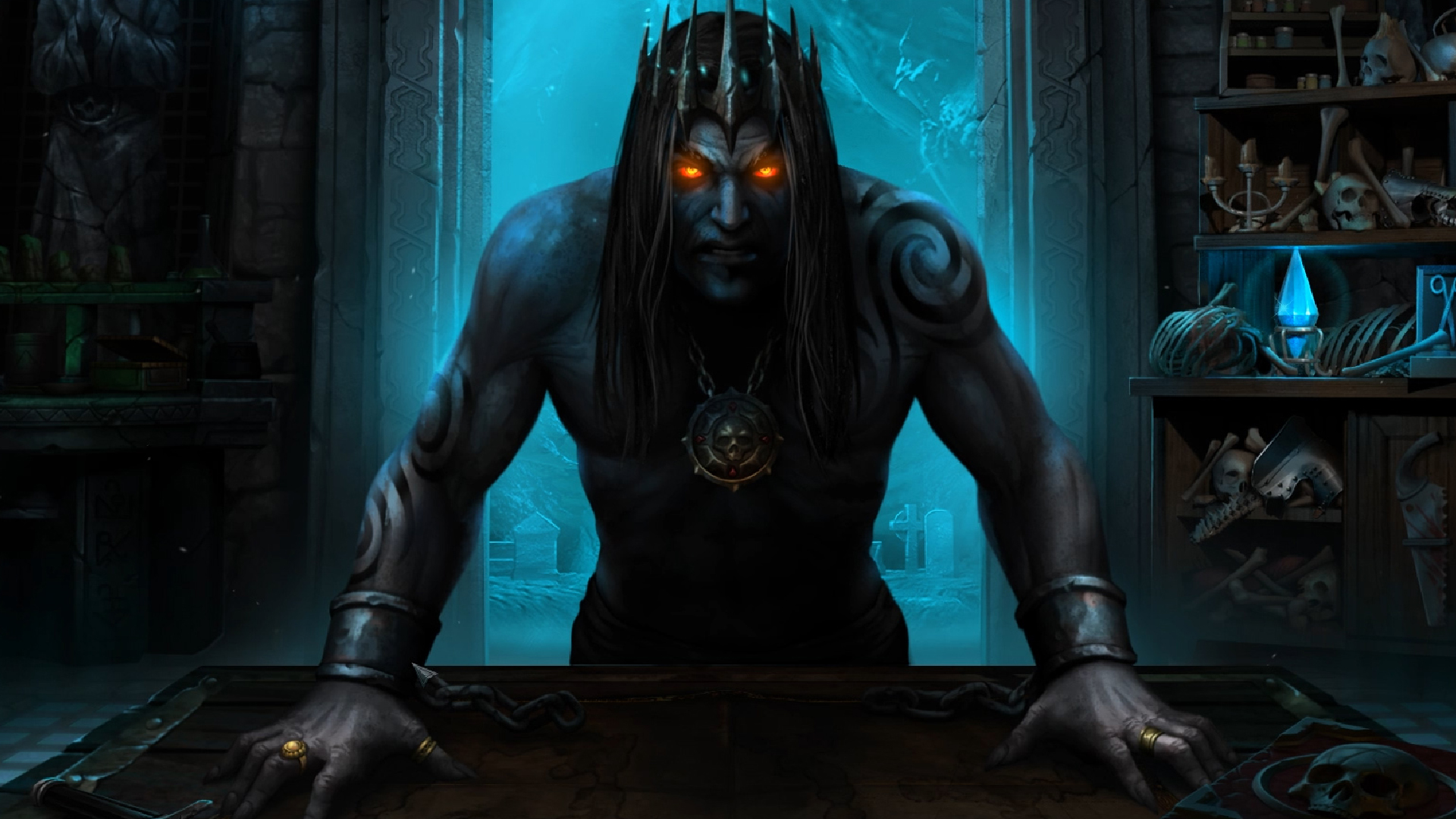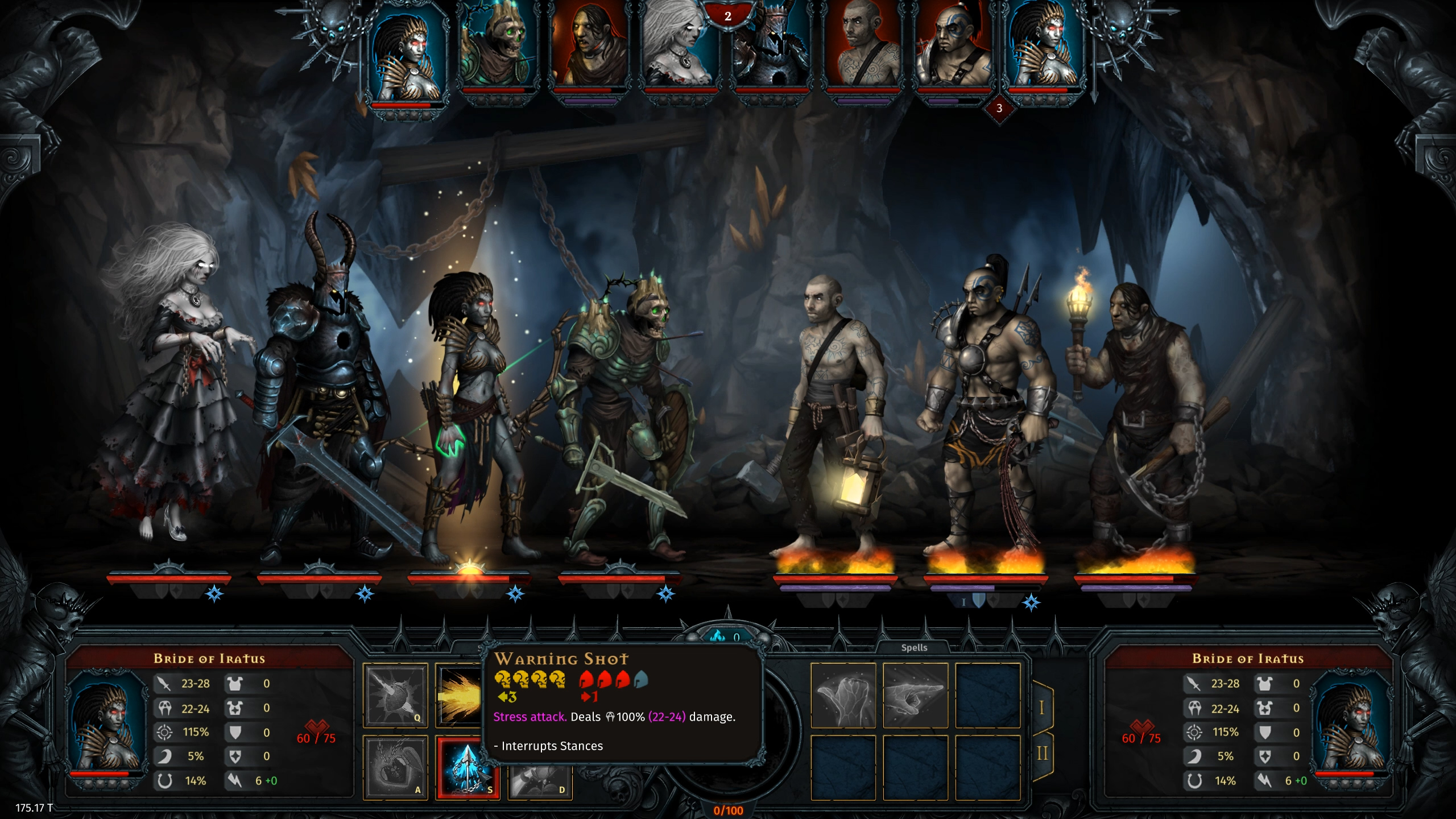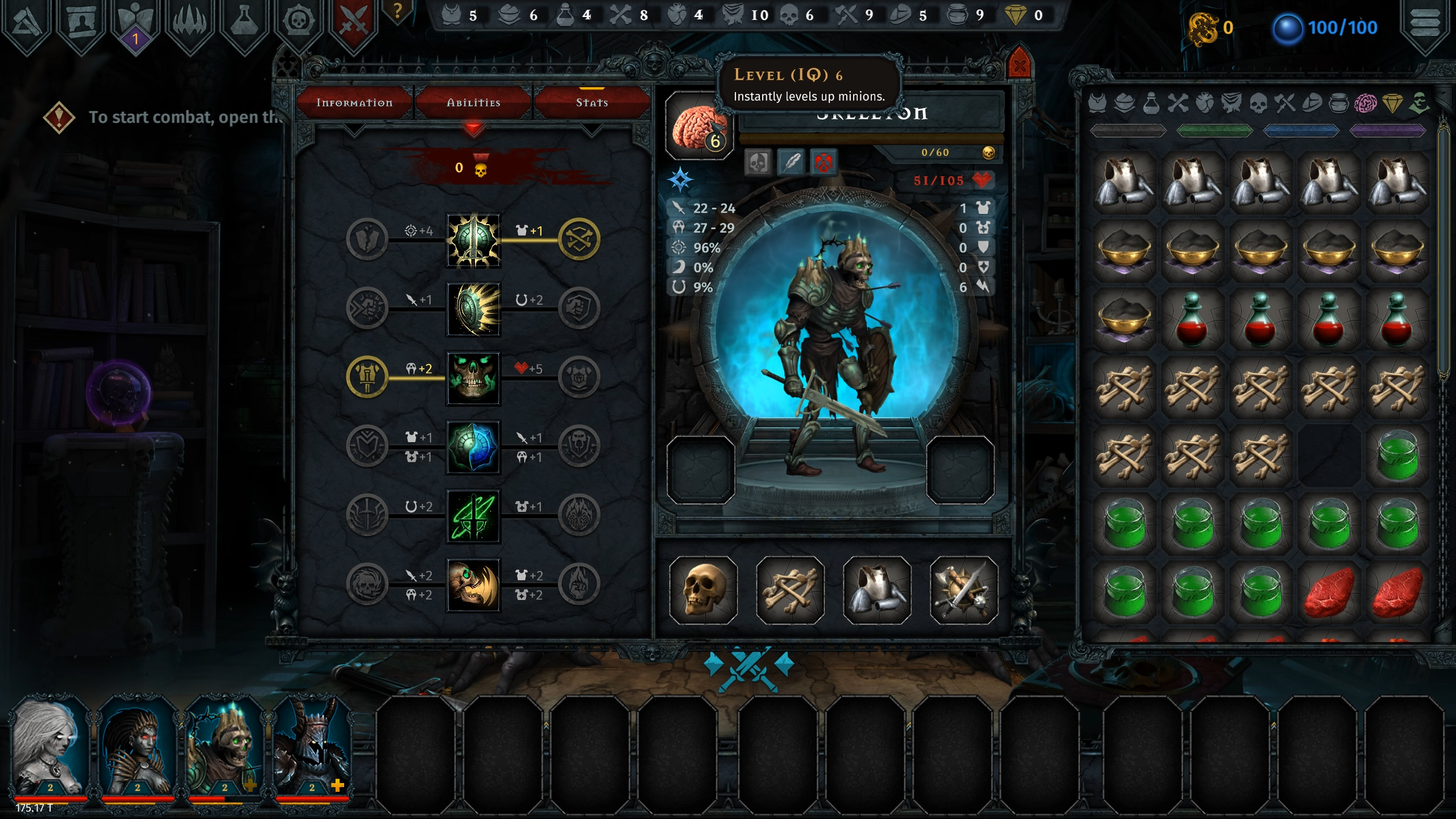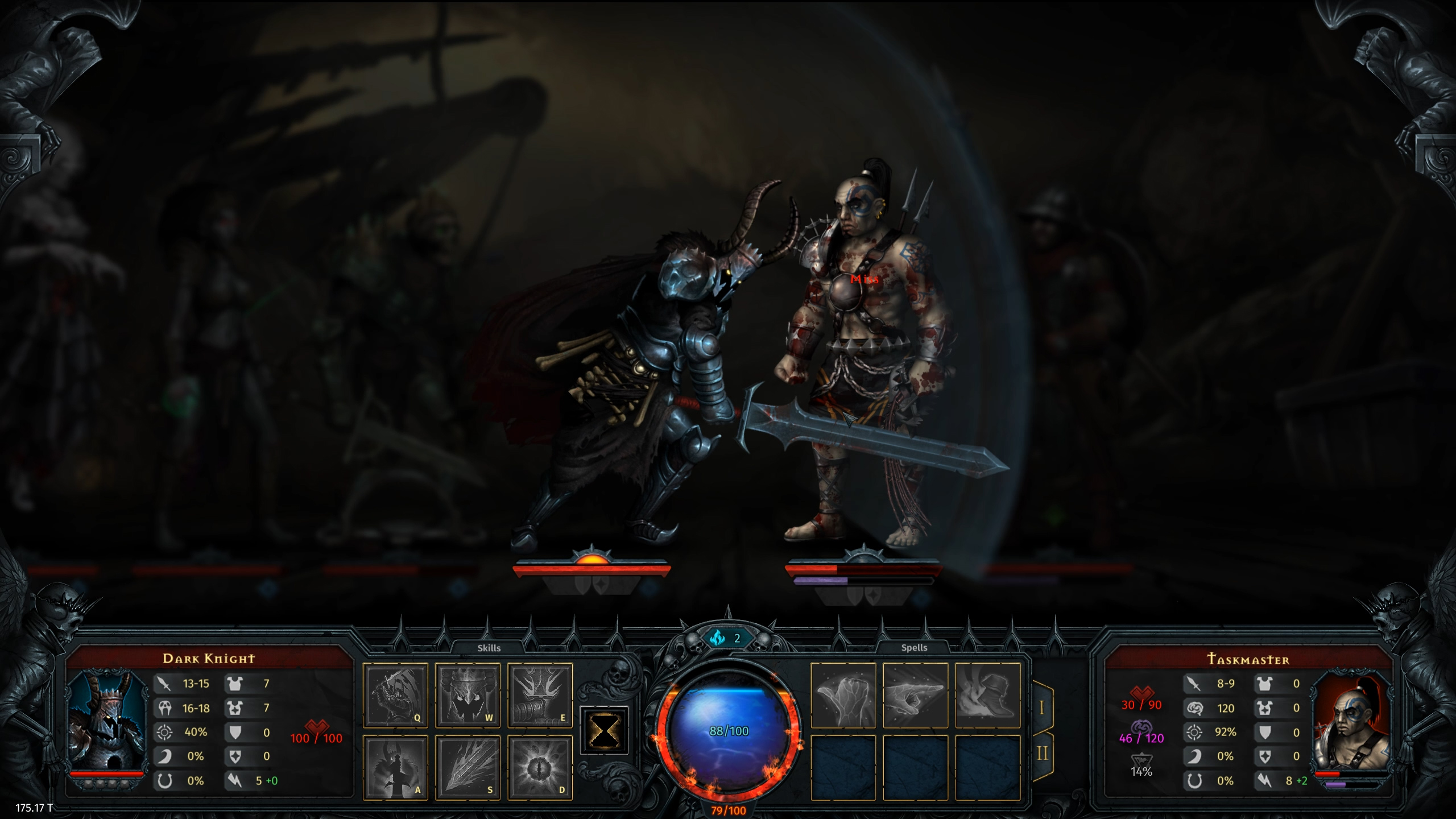Iratus is a Darkest Dungeon clone that's a lot smarter than I expected
What Iratus lacks in oppressive tension, it makes up for with depth and customization.

Iratus: Lord of the Dead doesn't play coy about being a Darkest Dungeon clone. It openly admits to copying the combat system on its website, and it only took me one round of fighting to see those similarities. As in Darkest Dungeon, I send squads of soldiers into punishing battles where positioning and random luck often matter more than how much damage each character does. Try as it might, Iratus can't replicate the pervasive dread and haunting aesthetic that makes Darkest Dungeon such a gripping roguelike. I'd be more disappointed if Iratus wasn't full of cool crafting systems and ways to customize my soldiers.
The big twist with Iratus, which launched out of Steam Early Access last week, is that I'm not the hero trying to save the world. I'm the villain trying to destroy it. Instead of diving deeper into dungeons, I start at the deepest level and work my way up, summoning armies of zombies, skeletons, and demons as I cleave through whatever do-gooders stand in my way. It's a neat inversion that changes some of the fundamental concepts of Darkest Dungeon. Instead of my heroes losing sanity and coping with a growing list of crippling defects, for example, I'm the one breaking the morale and resolve of my enemies.

This twist robs Iratus' combat of the tension that I found so exciting in Darkest Dungeon. My skeleton warriors and banshee mages don't have a sanity meter to manage, so I'm just trying to keep them alive rather than keep them alive and healthy. My enemies now face critical breaking points where they can either snap and acquire a negative defect, like a tendency to attack their allies or flee from combat, or a positive one that makes them harder to kill.
Those critical moments where I drain an enemy of the last of its sanity and it rallies and becomes even stronger are just as dangerous, but I miss that mounting unease as a foray into a dungeon turns into a disaster. Without that added depth to the wellbeing of my units, I don't feel nearly as attached to them when they inevitably die. It's a very different kind of experience than Darkest Dungeon, even though so much is similar. Another big change is that I don't have to commit my party to exploring a dungeon, rationing out resources and planning for worst-case scenarios. I have access to all of Iratus' crafting, healing, and customization features between each fight, so exploration is less of a war of attrition.
This tradeoff won't appeal to everyone, but Iratus compensates by doubling down on ways to customize and grow your units. Instead of hiring new recruits from a random assortment, I craft monsters using materials gathered from my slain enemies. These parts come in different rarities, giving me a lot of control over how powerful my creations are. I can even turn some of these parts into useful equipment for my troops. Tired of enemies dragging my weaker wraiths to the frontlines, I equipped one with legcuffs that prevent it from moving.

This pairs really nicely with Iratus' vast skill system. Like Darkest Dungeon, each unit type has different abilities available depending on their position in the party. But Iratus' feels much more complex. As characters gain levels, they earn points that increase their basic stats, but they occasionally also earn ability points that augment one of their skills in an interesting way.
Take my cannon-wielding zombie, for example. His Buckshot ability does modest damage to the first two units in the enemy party, but I can spend an ability point to make Buckshot either deal that damage to the entire party or ignore a single enemy's armor. Each of Iratus' 18 units has six abilities that can be modified like this, so there are tons of awesome ways to theorycraft the perfect squad.
The biggest gaming news, reviews and hardware deals
Keep up to date with the most important stories and the best deals, as picked by the PC Gamer team.
Though I miss the masochistic dread of Darkest Dungeon's combat, it's satisfying to discover all the ways these systems can be exploited to gain an edge in battles. Iratus, the titular necromancer, doesn't fight directly, but artifacts I equip to him provide some lovely benefits to my troops, and I can spend his mana to cast different spells, like ones that reposition allies or do some extra damage to enemies. Having all these tools at my disposal definitely makes Iratus feel a bit easier (or at least less oppressive), but I don't mind because having more control over my units opens up some neat strategies.

As an example, the Wraith has a powerful ultimate ability that deals heavy sanity damage to the entire enemy party and randomly shuffles them around. Pair that with the Bride of Iratus' Overwatch ability, which deals big damage every time an enemy moves, and I have one hell of a nasty one-two punch. Likewise, I love using my Wraith's Ghostly Veil spell to make my Skeleton exceptionally hard to hit just after I've used the Skeleton's Astounding Fortitude to goad enemies into attacking it more often. These little synergies between units are common and a lot of fun to discover.
I'm only a few hours into my first campaign, but I'm enjoying Iratus a lot more than I thought I would. I miss the intensity of juggling my party's mental and physical health, and, compared to Darkest Dungeons' gorgeous hand-painted aesthetic, Iratus' art sometimes looks a little goofy and cheap. But unlocking new units and discovering all the ways they complement each other is really fun.
With over 7 years of experience with in-depth feature reporting, Steven's mission is to chronicle the fascinating ways that games intersect our lives. Whether it's colossal in-game wars in an MMO, or long-haul truckers who turn to games to protect them from the loneliness of the open road, Steven tries to unearth PC gaming's greatest untold stories. His love of PC gaming started extremely early. Without money to spend, he spent an entire day watching the progress bar on a 25mb download of the Heroes of Might and Magic 2 demo that he then played for at least a hundred hours. It was a good demo.


